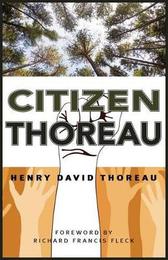
|
Citizen Thoreau: Walden, Civil Disobedience, Life Without Principle, Slavery in Massachusetts, A Plea for Captain John Brown
Paperback / softback
Main Details
| Title |
Citizen Thoreau: Walden, Civil Disobedience, Life Without Principle, Slavery in Massachusetts, A Plea for Captain John Brown
|
| Authors and Contributors |
By (author) Henry David Thoreau
|
|
Foreword by Richard F. Fleck
|
| Physical Properties |
| Format:Paperback / softback | | Pages:456 | | Dimensions(mm): Height 215,Width 139 |
|
| Category/Genre | Military history |
|---|
| ISBN/Barcode |
9781941821206
|
| Classifications | Dewey:814.3 |
|---|
| Audience | |
|---|
|
Publishing Details |
| Publisher |
West Margin Press
|
| Imprint |
Alaska Northwest Books
|
| Publication Date |
15 September 2014 |
| Publication Country |
United States
|
Description
This set of timeless essays from the quintessential American shares his valuable philosophies on nature, solitude, slavery, religion, politics, fulfilling work, civil responsibilities, and more. WALDEN, Thoreau's beloved and well-known reflection upon simple living in natural surroundings, looks at how the outside world can benefit from renouncing a materialistic way of life. "If the machine of government is of such a nature that it requires you to be the agent of injustice to another, then, I say, break the law." -Thoreau "If a plant cannot live according to its nature, it dies; and so a man." -Thoreau His other essays deal with the social problems of his time: CIVIL DISOBEDIENCE applies principles of individualism to civil life, culminating in a call for a life that answers to a power outside of and unaffected by the state. LIFE WITHOUT PRINCIPLE offers his program for a righteous livelihood through ten "commandments." SLAVERY IN MASSACHUSETTS is based on a speech he gave at an antislavery rally after the re-enslavement of fugitive slave Anthony Burns and relates that freedom could not exist while slavery remained. PLEA FOR CAPTAIN JAMES BROWN portrays his kinship to Brown's abolitionist efforts and anger toward the injustice Brown received. "Thoreau was a great writer, philosopher, poet, and withal a most practical man, that is, he taught nothing he was not prepared to practise in himself. . . . He went to gaol for the sake of his principles and suffering humanity. His essay has, therefore, been sanctified by suffering. Moreover, it is written for all time. Its incisive logic is unanswerable." -Mohandas Gandhi ". . . when, in the mid-1950s, the United States Information Service included as a standard book in all their libraries around the world a textbook . . . which reprinted Thoreau's 'Civil Disobedience,' the late Senator Joseph McCarthy succeeded in having that book removed from the shelves-specifically because of the Thoreau essay." -Walter Harding, in The Variorum Civil Disobedience "I became convinced that noncooperation with evil is as much a moral obligation as is cooperation with good. No other person has been more eloquent and passionate in getting this idea across than Henry David Thoreau. As a result of his writings and personal witness, we are the heirs of a legacy of creative protest." -Martin Luther King, Jr., Autobiography
Author Biography
Henry David Thoreau (July 12, 1817 - May 6, 1862) was an American author, poet, philosopher, abolitionist, naturalist, tax resister, development critic, surveyor, historian, and leading transcendentalist. He is best known for his book Walden, a reflection upon simple living in natural surroundings, and his essay Civil Disobedience, an argument for individual resistance to civil government in moral opposition to an unjust state. Richard F. Fleck is author of Desert Rims to Mountains High, and also foreword writer for the WestWinds Press: Literary Naturalist Series which includes Alaska Days with John Muir and The Maine Woods. He is editor of A Colorado River Reader. At age seventy-six he remains active by climbing mountains and guiding Sierra Club hikes in Colorado and Utah. He is married to Maura and has three children and seven grandchildren. He teaches occasional classes for Colorado Heights University in retirement.
Reviews"Featuring a foreword by Richard Francis Fleck, this book collects five of Thoreau's essays focused on the concept of the betterment of society and the individual. Walden, Civil Disobedience, Life Without Principle, Slavery in Massachusetts, and A Plea for Captain John Brown are included in their entirety. Fleck is the author of Desert Rims to Mountains High and the editor of A Colorado River Reader. He is also the foreword writer for the West Winds Press Literary Naturalist Series." -Eithne O'Leyne, Editor, ProtoView "Henry David Thoreau's life has been both vilified and commended; his writings studied, analyzed, scrutinized, heralded and excoriated. But for readers who have not had the pleasure, this new volume, Citizen Thoreau compiles five of his most famous essays into one highly readable tome. And what a pleasure it is. Walden, by far the longest essay, discusses Thoreau's time living in the woods, away from his town. This foray led him to a treasure of reflections, about the the truly important in life, about modern conveniences and luxury, about philanthropy, Nature, Truth - all intermingled with flowing, detailed descriptions of his environs, as well as being interspersed with far-ranging anecdotes of people or incidents that influenced his reflections. The other essays are much shorter, but no less cogent. In Civil Disobedience Thoreau defends his refusal to pay taxes because he would not support the Fugitive Slave Law and the Mexican War. Life Without Principle,continues his arguments about the futility of modern striving. Slavery in Massachusetts again addresses Massachusetts' Fugitive Slave Law; A Plea for Captain Brown defends John Brown's militant raid on Harper's Ferry in 1859 as necessary for bringing an end to the repugnant institution of slavery. Every paragraph teems with brilliant, and brilliantly-stated, insights. If you have never read Thoreau, you have been missing out; read these. If you have, you already know the value; this collection is a vault of gold." -San Diego Book Review
|